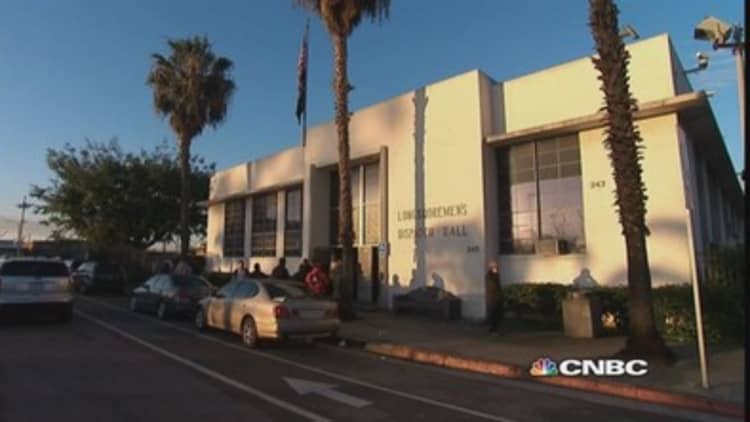
One shipping analyst calls the congestion at ports in Los Angeles and Long Beach the "worst-ever on record."
For months, both shippers and longshoremen have accused each other of intentionally slowing operations to gain leverage in contract negotiations that began last May. Congestion was already building due to more ships, larger ships and a lack of maintained truck trailers to move cargo off the docks.
However, gridlock intensified in November. The Pacific Maritime Assocation, which represents employers, claimed longshoremen began holding back crews after Halloween in order to pressure employers, while the International Longshore and Warehouse Union, representing dockworkers, claimed the opposite, saying that employers are asking for only half the normal work crews.
Read MoreAfter earnings surprise, has Amazon topped out?
CNBC visited a dispatch hall—where jobs come in from employers and dispatchers hand them out to union members—to try to determine who is right. Dispatchers are union members who work with management.
The visit raised more questions than answers.
"I haven't really seen anything change," said Ray Pearson, records clerk at the dispatch hall. When pressed on whether he had seen any reduction either in jobs posted or the number of union members willing and able to fill those jobs, he replied, "I am not aware of any slowdown on anybody's part."
CNBC looked at dispatch summaries for Thursday's first shift and compared them to records from Jan. 29, 2014. They were relatively similar: All the jobs were filled.
Anecdotally, that would indicate that Pearson is correct, and there's been no intentional slowdown. The only big difference is that there were twice as many ships in port this year.
Read More
However, the maritime association said the logs are misleading.
"Those final dispatch summaries ... do not accurately reflect employers' initial requests," said spokesman Steve Getzug. He said that, for example, one employer ordered 14 yard-crane operators Thursday but was told by the dispatch hall that only one operator would be made available. Getzug said the employer then went back and changed the order from 14 to 1.
We're getting a lot more ship, and a lot more cargo, and it's hard to take off the docks.Ray Pearsonrecords clerk
CNBC asked the union for comment on this allegation and will update this story as that information becomes available. The union has admitted that it has been holding back lesser-trained yard-crane operators due to a handful of accidents, claiming that employers are intentionally not hiring more capable "steadies." However, the union could not clarify to CNBC where in the daily hiring process lesser-trained operators are being told to stand down.
One possible bright spot in the talks is that the maritime association is reporting progress in negotiations on who should maintain and fix the truck trailers that move cargo out of the port. If that issue is resolved, perhaps it will have a domino effect on the rest of negotiations. But for Pearson, who also insists he's seen no intentional slowdown, the bigger issue is preparing for an increasing number of ships, and ships which are much larger than any he's ever seen.
"We're getting a lot more ships, a lot more cargo," he said, "and it's hard to take off the docks."


